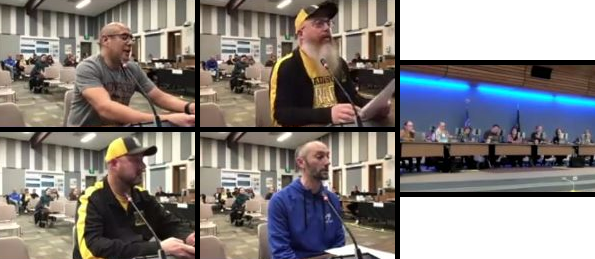4J middle school track coaches seek safer practice and meet schedule
8 min read
Presenter: 4J track coaches made the case for a four-day practice and track meet schedule. During public comment at the Feb. 5 meeting, James Longoria:
James Longoria (Monroe Middle School): My name is James Longoria and I’m the head track and field coach at Monroe Middle School and fourth-grade teacher at Holt Elementary.
[00:00:17] Today I’m here in support of my fellow coaches and to give my opinion of why remaining on a four-day practice and track meet schedule that consists of Monday, Tuesday, Wednesday, and Thursday is the best option.
[00:00:31] This schedule has had success in supporting family and student scheduling. Coaches are able to have practice and meet information ready for students and families. Head coaches are able to support their assistant coaches with workout plans and prep for Thursday track meets. A sequential four-day schedule with meets on Thursdays also allows the district head coaches time to collaborate for upcoming meets and take care of any issues that come up.
[00:00:59] I am in favor of students having a consistent practice schedule that ensures student safety, preparation to learn event techniques, and compete. Changing the dynamic of practices and track meets make way for problems in preparation, coaching commitment, and student commitment.
[00:01:17] If student athletes were to have days off on Wednesdays, Saturdays, and Sundays with the possibility of competing on Tuesdays, this makes it tougher on coaches’ preparation and students are susceptible to injuries. Tuesday meets starting later could also affect middle school and high school student learning, having to stay at meets late, get home late, and wake up early for school.
[00:01:42] Having Thursday track meets relieves head coaches having to work on weekends trying to prepare for Tuesday track meets.
[00:01:49] I am proud to be part of our Eugene School District 4J coaching staff. Our coaches want the best opportunities for our athletes. We want students excited to learn a healthy lifestyle, be ready for their other sports, and the opportunity to compete for their high school teams.
[00:02:05] Jason Erickson (Madison Middle School): My name is Jason Erickson. I teach at Madison Middle School and I’ve been there for 24 years now and I am the proud head coach of Madison as well and I’ve been doing that for 17 years. I’m here to also talk about the current situation of the practice schedule in the middle school ranks when it comes to track and field.
[00:02:25] One of my top concerns is the safety and injury prevention that we’re advocating for this Monday through Thursday schedule. Practicing the day before a meet allows athletes to properly warm up, stretch, reducing the risk of injury.
[00:02:38] By engaging in light warm-up activities and routines, athletes can identify any potential issues such as tight muscles or areas of discomfort that can become problematic during the meet. This pre-meet practice also helps athletes get familiar with their bodies, ensuring that they are physically prepared for the demands of racing and other events. It allows them to be prepared for competition.
[00:03:01] The day before a meet isn’t about intense training, it’s about making sure that the athletes are mentally and physically prepared. A light practice helps them get into that competitive mindset, allowing for mental focus and confidence on the day of the meet.
[00:03:15] It also has a chance to review race strategies, practice starts, and sharpen technique without overexertion. Practicing the day before ensures that athletes aren’t coming in cold and can build momentum for the actual day. It improves performance and competitiveness.
[00:03:32] Consistent practicing leading up to the meet improves overall performance. And athletes who practice the day before have a better understanding of their event-specific techniques. Whether it’s the pacing for a long-distance race or sprinting form, these last-minute adjustments can make a significant difference in their performance. The added confidence that comes from practicing the day before can give athletes an edge over those who do not take advantage of that opportunity.
[00:03:59] Finally, it allows for consistent routine. Having a practice the day before the meet helps athletes maintain that routine, which is critical for consistency in their performance. If athletes skip practice the day before, they may experience mental lapses or lack the sharpness required to perform their best.
[00:04:18] Staying in the rhythm of regular practices ensures athletes feel prepared and familiar with the process, which can reduce anxiety and uncertainty for the big day.
[00:04:29] I’m here representing my fellow coaches in the 4J School District as well, the 120+ athletes that participate at Madison Middle School and the over 1,100 athletes that participate in the school district and middle school track.
[00:04:42] 4J School District: Next up this evening is Jason Miller:
[00:04:45] Jason Miller (Madison Middle School): I’ve been teaching in the district for 29 years, all in the North region. I’ve proudly moved over to Madison in the last three, and I have coached track and field for over 25 years. So, traditionally, as you’ve heard, our practices are Monday, Tuesday, Wednesday, and Thursday, and we do four days a week.
[00:05:04] We have recently, after months of trying to plan the new season, been told that we’re looking at a practice schedule of Monday, Tuesday, and a Thursday meet time with a practice on Friday.
[00:05:14] So a couple of issues come up for me is equity and safety. Number one, you got the equity. High schools are practicing five days a week, but yet middle schools only practicing four days a week. High schools have the ability to practice on a Wednesday. Middle schools are not given the same opportunity.
[00:05:29] High schools have the ability to practice before their meets. Middle schools are not given the opportunity if we go with that Thursday meet schedule. High schools also get five coaches at 85 athletes where we as middle school only get a fifth coach if we have 105 athletes.
[00:05:47] So there’s some serious equity issues and there are actually a lot more. If you’d like to talk to me, I’ll definitely make time for you. But I really want to talk about the safety issue that’s been coming up.
[00:05:57] No coach is ever going to want to not have a practice before a meet, as you just heard Coach Erickson just talk about, the importance of having that ability to practice and get those mental reps. And if you remember your middle school, if you’ve had children or worked with middle school children, the ability to have that last minute, do you have your singlet? Do you have your shoes?
Now imagine we have to do that on a Tuesday with no ability to talk to them before that Thursday meet.
[00:06:23] So we have to make sure that they’re mentally prepared and ready to go for that, okay? Now there’s, we’ve actually sent some opportunities of looking at ability to have some compromises from that. And what we’ve been told is we can move the meets to Tuesdays.
[00:06:38] So imagine this, you have a light meet on practice on Monday, a meet on Tuesday, no practice on Wednesday, and then you have practice again on Thursday and Friday. So you’re having the least amount of time to really work on the reps for mental and personal reps for the kids to do better.
[00:06:56] And then what we’ve shifted, because the high schools have meets on Wednesdays, we’ve now shifted the problem to the high schools. They will not have the ability to practice on the day before because the high schools help us practice and by doing that we’ll now be in their way and they won’t.
[00:07:12] And if we take a late start, 5 or 6 (p.m.), now 5 o’clock, that’s expecting that transportation is going to get us there on time. Over 25 years, and we’ve had (a) late (start), that doesn’t happen. That means we could be starting 5:15, 5:30. The high school students are going to be there the whole time while we go through the meet so they’re not going to get the proper rest they need before their meet, and we’re going to be there till 9 p.m., which means there’s the issue of no dinner.
[00:07:38] When did a meeting become more important than our students’ safety?
[00:07:43] Scott Bush (Cal Young Middle School): My name’s Scott Bush and I’m an educational assistant out at Cal Young Middle School, where I’m also the head cross-country coach and assistant track coach for the long-distance runners.
[00:07:53] This past fall, during our middle school cross-country season, the decision was made to move the practice schedule to a Monday, Tuesday, Thursday, and Friday. We were informed that having practice on Wednesday was not allowed despite everything going very successful for us during the track season in the previous year.
[00:08:12] This decision didn’t seem to make sense for us at the start of the season and the opinions of the coaches when we talked to people downtown did not seem to matter when they should have. Myself and other 4J coaches went through this trial and error of experiences through this change and I would like to share a little more with you this evening as my other coaches have.
[00:08:34] The Fridays every week as I took attendance, we had a lower attendance among the students. Often students would have family obligations that kept them from practicing on Fridays.
[00:08:46] The students that didn’t attend Friday were also generally at least a little bit tired when there was a Thursday meet.
[00:08:51] Also kind of as a side note. It is important to consider some weeks, there were Wednesday meets still held, which kind of dispels the theory that we can’t practice on Wednesdays. Either way, early in the season, these Friday practices were unproductive for us. I made the decision to make that day purely a day of running games to support their fatigue and kind of encourage their attendance. While it works for the remainder of the season, it is unproductive for both the coaches and the improvement of our athletes and is also creating the conditions that could result in injury when they should not be pushing their bodies. This is true even for elite athletes.
[00:09:29] And we’re talking about middle school kids. They have little to no experience in the sport. They need time to recover. There were other safety concerns with the cross-country schedule in the fall of ’24. All of the meets 4J schools attended, we arrived around 30 to 45 minutes prior to the start of the race. Considering the fact that we are talking about middle schoolers, again, it’s not enough time to prepare.
[00:09:53] Ideally the team needs to walk the course so the kids know where they’re going and what to expect, as the courses each place will greatly vary. More importantly, students do not have time to get properly warmed up.
[00:10:06] Coming from a long-time competitive trail runner who has had his share of injuries, I can vouch for how important all of these things are to keep our kids safe and prevent bodily injury.
[00:10:17] Based on this past cross-country season and a couple of decades of personal experience, it would seem in the best interest for 4J and to middle school students and their families to allow a Monday through Thursday schedule. This voice is unanimous as you see today among the coaches who are looking out for our kids first and foremost. (Thank you very much.) Thank you all for your time. I appreciate your consideration.
[00:10:39] Presenter: 4J track coaches from Cal Young, Madison, and Monroe middle schools make the case for a Monday through Thursday practice and meet schedule.




